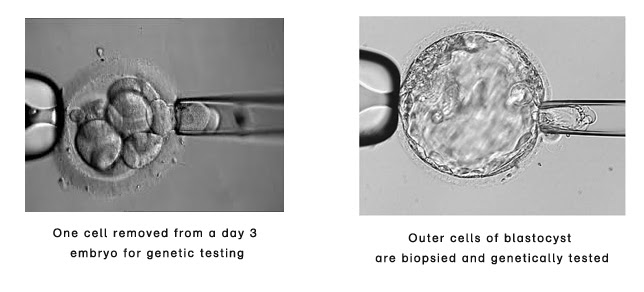Genetics And PGT
Preimplantation genetic testing (PGT) can help choose the best suited embryos for IVF transfer, giving you the best chance of achieving a healthy pregnancy. PGT testing can be added to IVF/ICSI treatments to rule out genetic or chromosomal abnormalities by testing embryos prior to implantation.
There are two types of PGTtesting: (1) for single gene defects (PGT-M) and (2) testing for embryo chromosomes (number and structure of the chromosomes, PGT-A) using Next generation sequencing (NGS). Screening for genetic traits in parents can estimate the risk of transmission in pregnancy. We aim at increasing detection of the common recessive genetic diseases and if found, minimize the chance for their transmission to the baby. Those who might benefit from PGT:
- Those with known genetic abnormalities
- Those with few or no ejaculated sperm
- Those affected by inheritable diseases
- Those affected by recurrent pregnancy loss
- Those with repeated implantation failure
- Advanced maternal age
- Good prognosis patients undergoing single embryo transfer (SET)
- Those undergoing sex selection
Marked advancement in genetics & PGT for common genetic diseases, prevention of transmission of inheritable diseases to children and identification of abnormal chromosomes in the embryos
- Genetic screening; screening for genetic traits in parents can estimate the risk of transmission to children. Screening entails a simple blood test and is available for a large group of disorders including Cystic Fibrosis, Sickle Cell Disease, Spinal Muscular Atrophy (SMA), BRCA1 and 2 (Breast Cancer Gene), Thalassemias, Ashkenazi Jewish Panel, Fragile X, and many others. We aim at increasing detection of the common recessive genetic diseases and if found, minimize the chance for their transmission to the baby. Example; if the mother is a carrier for cystic fibrosis (she is normal but carries one abnormal copy of the gene) and the father also carries one abnormal copy of the gene then the newborn is at 25% (1 in 4) risk of having the disease. This can be avoided by testing the embryos for cystic fibrosis and transfer of unaffected ones.
- Men or women suspected of carrying a genetic problem not included in screening tests are specifically tested for this disease e.g Huntington disease, Marfan syndrome , and undergo genetic counseling to assess the risk of transmission to their children.
- Men with few or no ejaculated sperm are at increased risk for chromosomal abnormalities (e.g Klinefelter’s Syndrome), small deletion (lost segment) in the Y chromosome, Congenital Absence of the Vas Deferens, the ducts that conduct sperm from the testes.
- Genetic testing for single gene disorders; if parents are carriers or affected by a heritable disease or if a prior baby is affected, oocytes or embryos can be tested and unaffected embryos are transferred to avoid pregnancy with an affected newborn.
- Sex selection can accomplished by genetic testing for X and Y chromosome to avoid some sex linked genetic diseases in babies or for family balancing.
- Recurrent pregnancy loss. Chromosomal testing for embryos; biopsy of one or few cells from each embryo and subsequently testing them for chromosomal number and some structural abnormalities. This could be helpful if a parent carrying structural chromosomal abnormalities that is causing recurrent miscarriage (e.g translocations; part of one chromosome is attached to another chromosome).
- Chromosomal testing of embryos and IVF outcomes; not all human embryos produced are normal. The human cell has 46 chromosomes. Significant proportions of embryos produced after natural or assisted conception carry chromosomal abnormality (mostly abnormal number of chromosomes). It is possible to test all chromosomes in an embryo aiming at selecting the normal embryos for transfer into the womb.
Different uses of PGD are also discussed by The American Society for Reproductive Medicine.
Biopsy For PGT

Material used for genetic testing can be obtained at several stages depending on clinical situation and type of genetic problem tested:
- Polar body biopsy (Oocyte)
- Embryo biopsy (Day 3 embryo)
- Trophoectoderm biopsy (blastocyst)
Genetic Testing Of Eggs And Embryos
Two types of genetic testing are used depending on the aim
- Testing for a specific single gene defects: if the exact mutation is known from analyzing the defect in parents or a prior sibling (multiplex PCR)
- Testing for all embryo chromosomes (number and structure of the chromosomes but not specific genes): comparative genomic hybridization (array cGH) or single nucleotide polymorphism (SNP array).
The advancement of genetics & PGD can minimize the chance for disease transmission to children. The use of PGD to select chromosomally normal embryos and improve IVF success in parents carrying no chromosomal abnormalities, is relatively new and awaits further studies.
